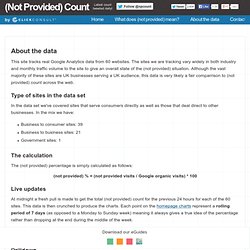

Google Analytics Can Now Exclude Traffic From Known Bots And Spiders. Google made a small but important update to Google Analytics today that finally makes it easy to exclude bots and spiders from your user stats.

That kind of traffic from search engines and other web spiders can easily skew your data in Google Analytics. Unfortunately, while generating fake traffic from all kinds of bot networks is big business and accounts for almost a third of all traffic to many sites according to some reports, Google is only filtering out traffic from known bots and spiders. It’s using the IAB’s “International Spiders & Bots List” for this, which is updated monthly. If you want to know which bots are on it, though, you will have to pay somewhere between $4,000 and $14,000 for an annual subscription, depending on whether you are an IAB member. Depending on your site, you may see some of your traffic numbers drop a bit. IMAGE BY Flickr USER Pascal UNDER CC BY 2.0 LICENSE (IMAGE HAS BEEN MODIFIED)
SEO is Dead. Long Live OAO. 9 tips for implementing online audience optimization strategies now.

For content publishers, search engine optimization—which we’ve all come to know as SEO—is dead. Rising from its ashes is OAO—online audience optimization. SEO was the art and science of creating web pages that generated traffic and high rankings in the search engines. It relied on keywords, links, page rank, and site structure to work its magic, and it has always been a bit of a moving target for webmasters. Search engines, wishing to stay ahead of SEO spammers who might use the knowledge to game the system, have kept their algorithms secret, constantly tweaking them to prevent their exploitation. As publishers have gotten more sophisticated in their online presence, they have chafed under perceived restrictions of optimizing pages for search. 2013 Search Engine Ranking Factors Survey & Correlation Data. Every two years, Moz surveys the opinions of dozens of the world's brightest search marketers and runs correlation studies to better understand the workings of search engine algorithms.
We gather this data to gain insight into the factors that may help—or hurt—a website's visibility in search engines. This year, Moz surveyed over 150 leading search marketers who provided expert opinions on over 90 ranking factors. In addition, the Data Science team at Moz, lead by Dr. Matthew Peters, ran an extensive correlation study to determine which features of websites and webpages are associated with higher search rankings.
For the first time this year, Moz partnered with several data partners to enhance the study, including SimilarWeb, DomainTools, and Ahrefs. Note that these factors are not "proof" of what search engines use to rank websites, but simply show the characteristics of web pages that tend to rank higher. About the data - Not Provided Count. This site tracks real Google Analytics data from 60 websites.

The sites we are tracking vary widely in both industry and monthly traffic volume to the site to give an overall state of the (not provided) situation. Although the vast majority of these sites are UK businesses serving a UK audience, this data is very likely a fair comparrison to (not provided) count across the web. Type of sites in the data set In the data set we've covered sites that serve consumers directly as well as those that deal direct to other businesses. In the mix we have: Business to consumer sites: 39 Business to business sites: 21 Government sites: 1 The calculation The (not provided) percentage is simply calculated as follows: Why Omitting Keyword Data Is NOT the End of SEO. :: By Richie Lauridsen, SEOHaus :: This week, Google quietly made some small adjustments to their user protocol that has had massive implications on the way in which data is being reported, ultimately setting the blogosphere and the SEO industry on its head: With organic searches now operating on Google’s secure server, organic search keywords are now fully encrypted and will no longer be provided in Google Analytics reports.

This means webmasters and Analytics users everywhere will no longer be able to see what keyword query brought a user to their site. On this very site, the decision was even claimed to be another nail in the coffin for SEO professionals. Though there is no denying that the SEO industry is certainly taking note of the search engine’s decision, the change in data is neither unexpected, nor is it all that dramatic or damaging. Let’s take a closer look and find out why. Before we delve into this further, let’s look at the history of (not provided) keywords. 1. 2. 3. Link Building Glossary. Marketing and link building terms have become second nature to us.

Sometimes we forget that not everyone spends their who life building links. With that in mind, we’ve dedicated ourselves to creating a glossary of frequently used terms for the link building layperson. We will continue to update this list. If you find any terms that you are unfamiliar with or have general questions, please contact us. 14 Google Analytics Product Announcements from the 2013 GA Summit.